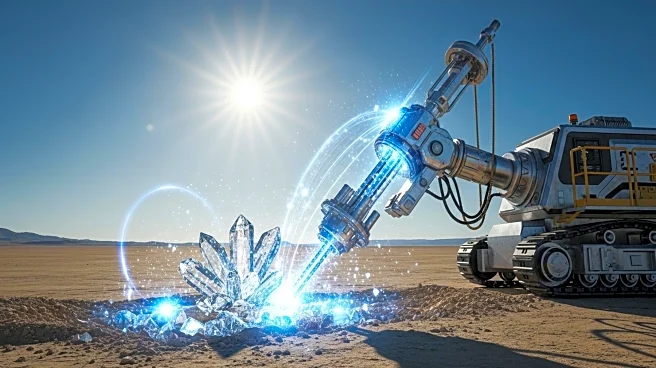What is the story about?
What's Happening?
Locksley Resources is advancing its Mojave Antimony and Rare Earths Project in California, located near the Mountain Pass mine, the only active rare earths mine in the United States. This development is part of a broader trend where companies are focusing on U.S.-centric assets to capitalize on the growing demand for critical minerals. The company plans to list on the Frankfurt Stock Exchange to attract European investors, aligning with its strategy to explore rare earth and antimony resources in the U.S. This move comes as geopolitical tensions and supply chain risks persist, with China maintaining a strong hold on the global supply of critical minerals such as antimony, gallium, and rare earths.
Why It's Important?
The development of domestic rare earth and antimony projects is crucial for the U.S. as it seeks to reduce dependency on China, which currently dominates the global supply chain for these critical minerals. This shift is significant for industries involved in decarbonization efforts, such as those producing heavy magnets, wind turbines, and electric vehicles. By investing in local resources, the U.S. aims to secure its supply chains and support technological advancements. Companies like Locksley Resources are positioned to benefit from increased investor interest in U.S.-based assets, potentially leading to more robust domestic production capabilities and economic growth.
What's Next?
Locksley Resources' listing on the Frankfurt Stock Exchange is expected to enhance its access to European capital, supporting its exploration and development activities in the U.S. As geopolitical tensions continue, the focus on securing domestic supply chains will likely intensify, prompting further investment in U.S.-centric projects. The ongoing demand for critical minerals may lead to more partnerships and collaborations between U.S. companies and international investors, aiming to bolster the nation's resource independence and technological capabilities.
Beyond the Headlines
The strategic focus on U.S.-based critical mineral projects highlights broader geopolitical shifts and the importance of resource nationalism. As countries strive to secure their supply chains, ethical considerations regarding environmental impact and sustainable mining practices may come to the forefront. Additionally, the emphasis on collaboration and diversification of supply sources could lead to long-term changes in global trade dynamics and investment patterns.















